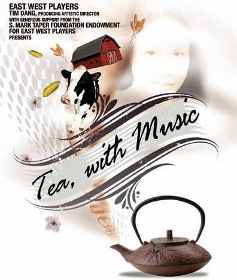LIKE ADDING MILK TO GREEN TEA, A GREAT PLAY IS SPOILED BY ADDING MUSIC.
Post World War II Era in America isn’t a red, white, and blue haven with a backyard and a Buick waiting for everyone who wants to work. While the newsreels spun wildly about the success of the Marshall Plan, the development of the United Nations, and the creation of NATO, minorities in the USA became casualties of racism, unequal treatment, and were denied opportunities for success because of their skin color or heritage. It is bizarre that America freely freed victims (minorities in their own countries) suffering from the bigotry of the majority and couldn’t see how they were committing a similar injustice to their fellow citizens when they arrived back home.
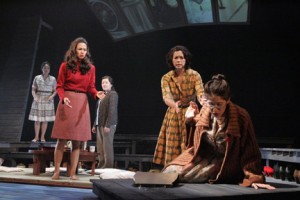 Tea is a transportive and touching play by Velina Hasu Houston that features five sharply drawn Japanese women married to American soldiers who have made Kansas their new permanent home. The five women gather together for tea as they mourn the suicide of Himiko (Joan Almedilla), who realizes she is present in spirit only, the first of their company to pass away. They pass the time drinking tea and ruminating on the struggles, sacrifices, and disconnect they face with their lives in America, while Himiko tries to make sense of how her life got so out of hand and wound up in limbo.
Tea is a transportive and touching play by Velina Hasu Houston that features five sharply drawn Japanese women married to American soldiers who have made Kansas their new permanent home. The five women gather together for tea as they mourn the suicide of Himiko (Joan Almedilla), who realizes she is present in spirit only, the first of their company to pass away. They pass the time drinking tea and ruminating on the struggles, sacrifices, and disconnect they face with their lives in America, while Himiko tries to make sense of how her life got so out of hand and wound up in limbo.
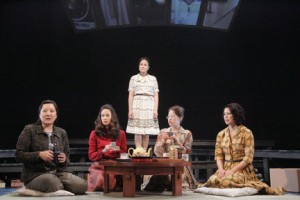 Now, East West Players presents Tea, With Music (book and lyrics by Houston and music by Nathan Wang), and in doing so, keeps with the current trend of “If it ain’t broke…make a musical out of it!” Unfortunately, transforming the play Tea into a chamber musical proves to be a mistake and breaks the power the piece has as a play. The musical elements sound tacked-on, and the dialogical elements lose momentum every time a perfunctory song is called to be performed. On top of that, Jon Lawrence Rivera’s direction fails to seamlessly bridge the music and dialogue that exists.
Now, East West Players presents Tea, With Music (book and lyrics by Houston and music by Nathan Wang), and in doing so, keeps with the current trend of “If it ain’t broke…make a musical out of it!” Unfortunately, transforming the play Tea into a chamber musical proves to be a mistake and breaks the power the piece has as a play. The musical elements sound tacked-on, and the dialogical elements lose momentum every time a perfunctory song is called to be performed. On top of that, Jon Lawrence Rivera’s direction fails to seamlessly bridge the music and dialogue that exists.
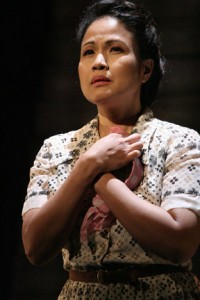 Joan Almedilla leads the ensemble as the woman-turned-spirit Himiko, and while she sings her songs well she does not interpret them well. Additionally, her acting is similarly lacking—the lines are there to make an impact, but it doesn’t cut through because she is too soft and tepid in her portrayal of what is supposed to be a frustrated and fiery woman. Janet Song plays Chizuye, the most assimilated to the American lifestyle of the group, with a great earthy brashness. However, her singing is markedly the weakest—it stands out for the wrong reasons when the ensemble sings in harmony. Tiffany-Marie Austin is delicious in her holier-than-thou portrayal of Atsuko, the most “refined” and “pure” (for marrying a Japanese-American) of the bunch. She steals scenes and is utterly captivating in her prickly “perfect” portrayal of the goody two-slippers tightwad. Yumi Iwana is precious as the naïve Setsuko and earns many laughs with her earnest characterization. Jennie Kwan plays the youthful Teruko and interprets her songs with the most panache of the ensemble; she makes sense of her lyrics and sings them exceptionally well.
Joan Almedilla leads the ensemble as the woman-turned-spirit Himiko, and while she sings her songs well she does not interpret them well. Additionally, her acting is similarly lacking—the lines are there to make an impact, but it doesn’t cut through because she is too soft and tepid in her portrayal of what is supposed to be a frustrated and fiery woman. Janet Song plays Chizuye, the most assimilated to the American lifestyle of the group, with a great earthy brashness. However, her singing is markedly the weakest—it stands out for the wrong reasons when the ensemble sings in harmony. Tiffany-Marie Austin is delicious in her holier-than-thou portrayal of Atsuko, the most “refined” and “pure” (for marrying a Japanese-American) of the bunch. She steals scenes and is utterly captivating in her prickly “perfect” portrayal of the goody two-slippers tightwad. Yumi Iwana is precious as the naïve Setsuko and earns many laughs with her earnest characterization. Jennie Kwan plays the youthful Teruko and interprets her songs with the most panache of the ensemble; she makes sense of her lyrics and sings them exceptionally well.
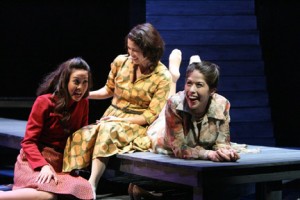 John H. Binkley’s set is spacious with ramps coordinated with an attractive, angular, symmetrical flow that unfortunately converges upstage instead of downstage, where it would be more appropriate and engaging. Again, I blame that on Rivera. Adam Flemming’s projections serve their utilitarian purpose, while the same can be said for Adam Blumenthal’s lights, which are not flashy but serve the piece well. Mylette Nora’s costumes are well picked, fitted, and help to inform each character; Atsuko is conservative and more Japanese, as such—her clothes are the most Japanese looking. Whereas Chizuye is looser and more American—she forgoes her Japanese robes for American threads.
John H. Binkley’s set is spacious with ramps coordinated with an attractive, angular, symmetrical flow that unfortunately converges upstage instead of downstage, where it would be more appropriate and engaging. Again, I blame that on Rivera. Adam Flemming’s projections serve their utilitarian purpose, while the same can be said for Adam Blumenthal’s lights, which are not flashy but serve the piece well. Mylette Nora’s costumes are well picked, fitted, and help to inform each character; Atsuko is conservative and more Japanese, as such—her clothes are the most Japanese looking. Whereas Chizuye is looser and more American—she forgoes her Japanese robes for American threads.
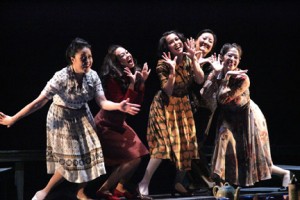 Although the ensemble gels well together, they are hampered by Rivera’s poor staging. If it is an intimate chamber piece, then why does Rivera play the piece center and upstage the entire time? Is he intimidated by making an intimate piece intimate? Does he feel the audience will lean closer if the players stand further? Whatever the reasoning is, it is detrimental to the impact of the show. The only time that the players come forward is when they take their bows. It is as if Rivera told his actors, “Kneel near the table during the dialogue scenes; Stand up and spread out far and wide when you sing.” It is even more of an eyesore because Giovanni Ortega’s choreography is so staid, simple, and stilted. There is a moment where Himiko, the lead, stands alone on stage towards the end of the show, singing loudly about how it’s her time to “take the stage”—but she remains center-right, and when the song builds to its climax and she reflects on her dead daughter, she turns to her left as she calls her daughter’s name. This moment is one that ought to have overwhelming effect on the audience, but becomes diffused and dulled by the awkward posturing and weak positioning.
Although the ensemble gels well together, they are hampered by Rivera’s poor staging. If it is an intimate chamber piece, then why does Rivera play the piece center and upstage the entire time? Is he intimidated by making an intimate piece intimate? Does he feel the audience will lean closer if the players stand further? Whatever the reasoning is, it is detrimental to the impact of the show. The only time that the players come forward is when they take their bows. It is as if Rivera told his actors, “Kneel near the table during the dialogue scenes; Stand up and spread out far and wide when you sing.” It is even more of an eyesore because Giovanni Ortega’s choreography is so staid, simple, and stilted. There is a moment where Himiko, the lead, stands alone on stage towards the end of the show, singing loudly about how it’s her time to “take the stage”—but she remains center-right, and when the song builds to its climax and she reflects on her dead daughter, she turns to her left as she calls her daughter’s name. This moment is one that ought to have overwhelming effect on the audience, but becomes diffused and dulled by the awkward posturing and weak positioning.
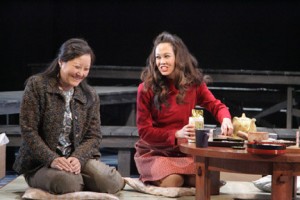 The piece is brimming with so many thoughtful important ideas and themes concerning race, belonging, tradition, assimilation, identity, and freedom discussed by five very strong characters that it is exasperating when an acclaimed director like Rivera egregiously mishandles a grand opportunity to showcase something powerful.
The piece is brimming with so many thoughtful important ideas and themes concerning race, belonging, tradition, assimilation, identity, and freedom discussed by five very strong characters that it is exasperating when an acclaimed director like Rivera egregiously mishandles a grand opportunity to showcase something powerful.
photos by Michael Lamont
Tea, with Music
East West Players at Union Center for the Arts
scheduled to end on December 9, 2012
for tickets, call 213-625-7000, or visit http://www.eastwestplayers.org
